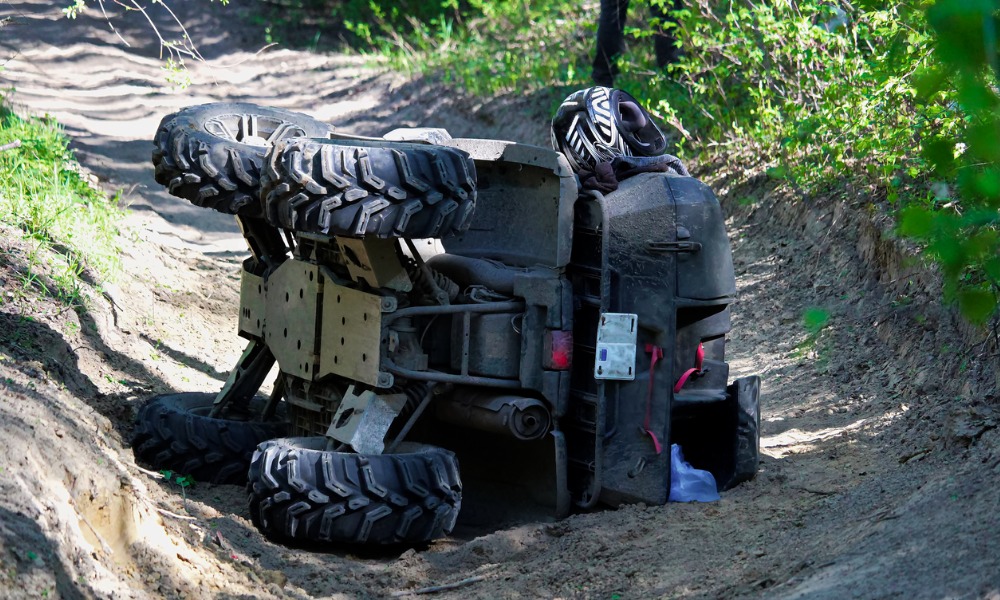
A passenger was thrown from vehicle and suffered serious injuries resulting in complete paraplegia

The Ontario Court of Appeal has upheld an insurance coverage claim in an accident involving a four-wheeled all-terrain vehicle (ATV) despite a breach of a statutory condition.
The dispute in Pridmore v. Drenth, 2023 ONCA 606, stemmed from an incident on Bird Road, a highway in rural Dunnville, Ontario. Breanne Pridmore was a passenger on an ATV driven by Tyler Drenth. She suffered severe injuries resulting in complete paraplegia after she was thrown from the ATV. Tyler had a G1 driver's licence, and his father, Theodore Drenth, was the registered owner of the ATV.
At the time of the incident, Theodore had third-party liability coverage of $1 million with Novex Insurance Company. The central issue in this case revolved around Novex's denial of coverage to Theodore based on a breach of a statutory condition. The insurance company argued that Theodore permitted Tyler to operate the ATV on a highway when he did not have the required driver's license.
The motion judge ruled against Novex, finding that Theodore was entitled to coverage. The Drenth home borders rural Dunnville and is about a half-block from the off-road fields and trails where Theodore and Tyler rode their ATV. Their home backs onto Central Lane. They began and ended their ATV rides by driving on Central Lane, or alongside it, to gain access to the off-rode trails and fields.
The court acknowledged that Central Lane, where the ATV was routinely driven, qualified as a highway under the Highway Traffic Act. The judge highlighted that Tyler had breached the statutory condition on the day of the incident by going on the shoulder of Bird Road after consuming alcohol. However, the crucial determination was whether Theodore breached the statutory condition when he permitted Tyler to use the ATV.
The motion judge found Theodore's consent to Tyler's use of the ATV was clear and specific. Theodore had permitted Tyler to use the ATV for particular purposes, including driving on Central Lane to access open fields and trails, but not on other highways. The court relied on the reasonable foreseeability test and rejected Novex's arguments that Theodore's permission extended to driving on other roads.
The court further considered Theodore and Tyler's mistaken belief that Central Lane was not a highway, emphasizing that their mistake did not amount to Theodore's permission to drive on a highway. The judge concluded that Theodore did not know, and should not have known, that Tyler would operate the ATV on any highway other than Central Lane.
The decision also delved into whether Theodore's breach of the statutory condition tainted the entire trip. The court distinguished this case from precedent and concluded that Theodore's breach did not taint the entire journey, as the incident occurred on a highway for which Tyler had not been given permission.
Novex appealed to the Ontario Court of Appeal, arguing that the motion judge made a palpable and overriding error in finding that Theodore only permitted Tyler to drive on Central Lane and then on the trails. Novex also argued that Theodore is not entitled to coverage because he breached the statutory condition by permitting Tyler, an under-licensed driver, to drive his ATV on the shoulders of highways on the date of the loss.
The court dismissed Novex's arguments, ruling that the motion judge's findings were not "clearly wrong" nor "unsupported by the evidence." Consequently, the court found no basis for appellate intervention with the motion judge's determination that Theodore is entitled to third-party coverage.
Furthermore, the court found that the motion judge correctly approached the critical issue of the terms of the permission that Theodore gave Tyler for the use of the ATC on the day in question.
The motion judge found that Theodore breached the statutory condition when he permitted Tyler to drive the ATV on Central Lane. However, the motion judge said that the breach of the statutory condition must have tainted the trip. In this case, Theodore did not know or ought to have known that Tyler would drive the ATV on a highway other than Central Lane. Accordingly, the motion judge concluded that Theodore was not in breach of the statutory condition at the time of the incident.
The appeal court found that the motion judge made factual findings as the applicable legal principles required. He acknowledged and addressed Novex's arguments relating to the facts and gave compelling reasons for rejecting those arguments. Ultimately, the court found no basis for appellate interference with the motion judge's findings.